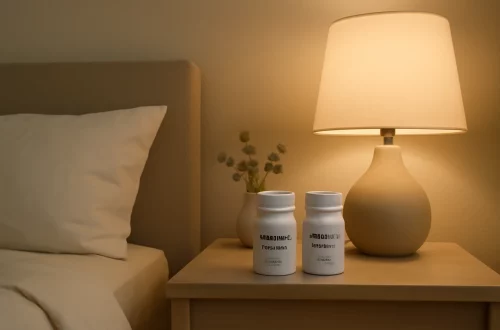
The Impact of Testosterone: Before and After Transformation Effects
Testosterone is often hailed as the cornerstone of male vitality, but its influence extends beyond mere physical attributes. This powerful hormone plays a critical role in various bodily functions, from muscle mass and bone density to mood regulation and energy levels. As society increasingly embraces the importance of hormonal health, the spotlight on testosterone has grown, prompting many individuals to explore its effects on their overall well-being.
In recent years, there has been a surge of interest in testosterone replacement therapy and lifestyle changes aimed at optimizing testosterone levels. The transformations witnessed by individuals undergoing such changes can be profound, impacting their physical appearance, emotional state, and even social interactions. However, the journey to understanding testosterone’s impact is often fraught with misinformation and misconceptions. Navigating this landscape requires a nuanced approach that considers both the potential benefits and risks associated with testosterone modification.
As more people seek to unlock the secrets of this vital hormone, it becomes essential to examine the transformation effects of testosterone. By understanding the before-and-after scenarios, individuals can make informed decisions and foster healthier lifestyles. This exploration sheds light on the multifaceted nature of testosterone, revealing its far-reaching effects on the human body and mind.
The Role of Testosterone in the Body
Testosterone serves as the primary male sex hormone, but its importance transcends gender. In men, it is produced mainly in the testes, while women produce it in smaller amounts in the ovaries and adrenal glands. This hormone is pivotal for the development of male reproductive tissues and promotes secondary sexual characteristics such as increased muscle and bone mass, as well as the growth of body hair.
One of the most significant roles of testosterone is its influence on muscle development. It enhances protein synthesis in the body, which is crucial for muscle growth and repair. This is why athletes often seek to optimize their testosterone levels to improve performance and recovery. Additionally, testosterone contributes to bone density; lower levels of the hormone can lead to an increased risk of osteoporosis, particularly in older adults.
Beyond the physical realm, testosterone is intricately linked to mood and cognitive function. Low testosterone levels have been associated with feelings of fatigue, depression, and irritability. Conversely, higher testosterone levels are often correlated with increased confidence and a generally more positive mood. This mental aspect of testosterone is vital, as it can affect personal relationships and overall quality of life.
The hormonal balance is delicate; too much testosterone can lead to health complications, including aggression and cardiovascular issues. Therefore, understanding the role of testosterone in the body is crucial for individuals looking to optimize their health without compromising their well-being.
Physical Transformations: Before and After
The physical transformations that individuals experience from testosterone optimization can be remarkable. For those with clinically low testosterone levels, the journey often begins with medical intervention, such as testosterone replacement therapy (TRT). The effects of this therapy can be seen within weeks to months, depending on individual circumstances.
Many individuals report increased muscle mass and strength after starting TRT. This is particularly notable for those who may have struggled with weight gain or muscle loss due to low testosterone levels. As muscle mass increases, many also experience a boost in metabolism, which can aid in weight management and fat loss. This transformation not only enhances physical appearance but also contributes to improved physical performance and stamina.
Another significant change observed is the impact on energy levels. Individuals often report feeling more energized and motivated to engage in physical activities. This newfound energy can lead to a more active lifestyle, further amplifying the physical transformation.
On the contrary, some may experience challenges during the transition, such as adjusting to changes in body composition and muscle definition. It is essential to approach these changes holistically, incorporating a balanced diet and exercise regimen to maximize the benefits of increased testosterone levels.
The psychological component of physical transformation also cannot be overlooked. Many individuals report heightened self-esteem and body image improvements as they witness the physical changes brought about by testosterone optimization. This newfound confidence can have a ripple effect, impacting various facets of life, from personal relationships to professional endeavors.
The Psychological Effects of Testosterone Changes
The psychological effects of testosterone changes are profound and often intertwined with physical transformations. As testosterone levels fluctuate, individuals may experience shifts in mood, motivation, and overall mental health. For many, the journey through testosterone optimization can lead to significant improvements in emotional well-being.
One of the most commonly reported benefits of increased testosterone levels is the enhancement of mood and emotional stability. Individuals who previously struggled with symptoms of depression or anxiety often find relief as their testosterone levels normalize. This improvement can lead to increased motivation and a more positive outlook on life, allowing individuals to engage more fully in their daily activities.
Moreover, testosterone has a notable impact on cognitive functions, including memory and focus. Many individuals report improved concentration and mental clarity following testosterone therapy or lifestyle changes aimed at boosting testosterone levels. This cognitive enhancement can be particularly beneficial in professional settings, where sharp focus and decision-making skills are crucial.
However, it is important to acknowledge that not everyone experiences these psychological benefits. Some individuals may face challenges such as mood swings or increased aggression, particularly if testosterone levels rise too quickly or significantly. This underscores the importance of monitoring and managing testosterone levels under the guidance of a healthcare professional.
Ultimately, the psychological effects of testosterone changes highlight the intricate connection between hormonal balance and mental health. By understanding and managing testosterone levels, individuals can work towards achieving a holistic sense of well-being that encompasses both physical and mental health.
Potential Risks and Considerations
While the benefits of testosterone optimization can be significant, it is crucial to approach this journey with caution and awareness of potential risks. One of the primary concerns related to testosterone therapy is the risk of over-treatment, which can lead to adverse effects such as increased aggression, mood swings, and even cardiovascular issues.
Additionally, individuals with certain pre-existing health conditions, such as prostate cancer or heart disease, should exercise caution when considering testosterone therapy. It is essential to consult with a healthcare provider to assess individual risks and determine the most appropriate course of action.
Another important consideration is the potential for dependency on testosterone therapy. Some individuals may become reliant on treatment to maintain their energy levels and mood, which can lead to challenges if they decide to discontinue therapy. A holistic approach that includes lifestyle changes such as exercise, a balanced diet, and stress management techniques can help mitigate this risk.
Lastly, it is important to remember that testosterone is just one piece of the puzzle when it comes to overall health. Hormonal balance is complex, and focusing solely on testosterone levels may overlook other essential hormones and factors that contribute to well-being.
In summary, while testosterone optimization can offer transformative benefits, it is vital to approach it thoughtfully and under professional guidance. By understanding the potential risks and considerations, individuals can make informed decisions that promote their overall health and vitality.
**Disclaimer:** This article is not intended as medical advice. For any health-related concerns or questions regarding testosterone therapy, it is always best to consult with a qualified healthcare professional.




